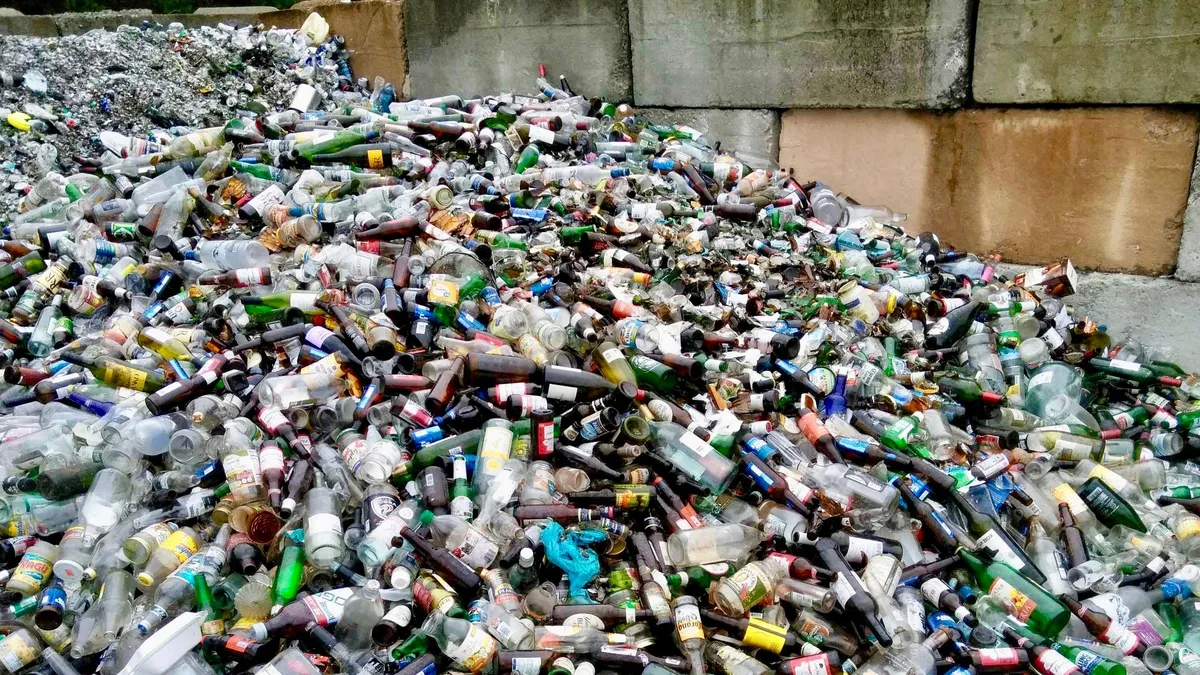Dive Brief:
- To strengthen markets for recycled glass and improve glass recycling rates, MRFs and municipalities are trying pilot programs and certifications, speakers said during a panel discussion the Southeast Recycling Development Council hosted Wednesday.
- MRFs often struggle to produce glass that's clean enough to sell to local markets. Panelists described how recycling pilot programs in North Carolina and Chicago have helped yield cleaner streams than those the communities collect from the curb. A MRF certification program aims to raise the profile of MRFs already creating clean glass streams.
- Advocates such as the Glass Packaging Institute (GPI) aim to increase the national glass recycling rate to 50% in the next decade. MRFs play a critical role in the effort because most glass in the U.S. gets recycled through curbside programs instead of through deposit returns or other takebacks, said Amy Uong, deputy general manager of Sims Municipal Recycling.
Dive Insight:
Numerous cities have cut glass collection from municipal recycling programs over the years because of high contamination rates, high transportation and processing costs, and limited markets. However, that trend seems to be slowing, and glass recycling proponents say strategic investments in increasing glass quality will help further reverse it.
In states without bottle redemption programs, about 66% of glass is not recycled, said Scott DeFife, GPI president. About 45% goes directly to the landfill, and the volume that goes through a MRF may end up in landfills as trash or as alternative daily cover because it's too contaminated to be sold into the glass market, he said.
Glass processed through a MRF could have 50% to 60% contamination, making it a tough sell to customers looking for clean, furnace-ready cullet. These quality concerns have fed the misconception that there are no end markets for glass, DeFife said. "The glass has value, it's the contamination that comes along with it that is taking the value of that material down."
Investing in dedicated processing equipment can cost thousands of dollars, so some municipalities have turned their attention to the incoming glass stream to improve glass quality before it enters the MRF.
Orange County, North Carolina recently launched its "Glass on the Side" program with help from a grant from the Glass Recycling Foundation (GRF). The program works with 107 bars and restaurants around the Chapel Hill region to collect glass bottles in specially dedicated bins designed to significantly reduce contamination. The county then sends the glass to recycler Strategic Materials.
The glass is "very high quality, very low contamination" because program participants receive training on how to sort the glass and receive check-in visits if the restaurant or bar is introducing too much contamination to the glass-only bins, said Kyra Levau, recycling education and outreach coordinator for Orange County Solid Waste. The county has collected 977 tons of glass so far since 2019, and it has been able to sell the glass for about $20 a ton.
GRF also helped fund the similar Don't Trash Glass effort in Chicago, an eight-week program that kicked off during Memorial Day weekend to collect glass containers at greater Chicago-area bars and restaurants.
Meanwhile, the Glass Recycling Coalition (GRC), a group of glass recyclers that aim to reduce barriers to glass recycling, and others have worked to raise the profile of MRFs that are producing cleaner glass. According to GRC's 2020 industry survey, about 36% of MRF respondents have some kind of additional equipment to clean glass. GRC offers a MRF certification process to recognize those that are most effective at cleaning the glass they receive by ranking participating facilities gold, silver or bronze.
Rumpke Recycling, an Ohio-based waste company with a dedicated glass plant in Dayton and MRFs in Kentucky, is among the companies that recently received a gold certification. Rumpke began investing in glass sorting equipment years ago, in part because glass is a "legacy material" that consumers expect to be able to recycle in their curbside bins, said Ben Pedigo, the company's recycling sales manager. Rumpke processes about 5,000 tons of glass each month and sees its long-term investment in glass recycling equipment as a big part of its overall business model.
"Tip fees are about $30 a ton in the Southeast, and not only do we want to keep [glass] out of landfills, our customers demand that," Pedigo said. "Glass is infinitely recyclable. It's an amazing material."














